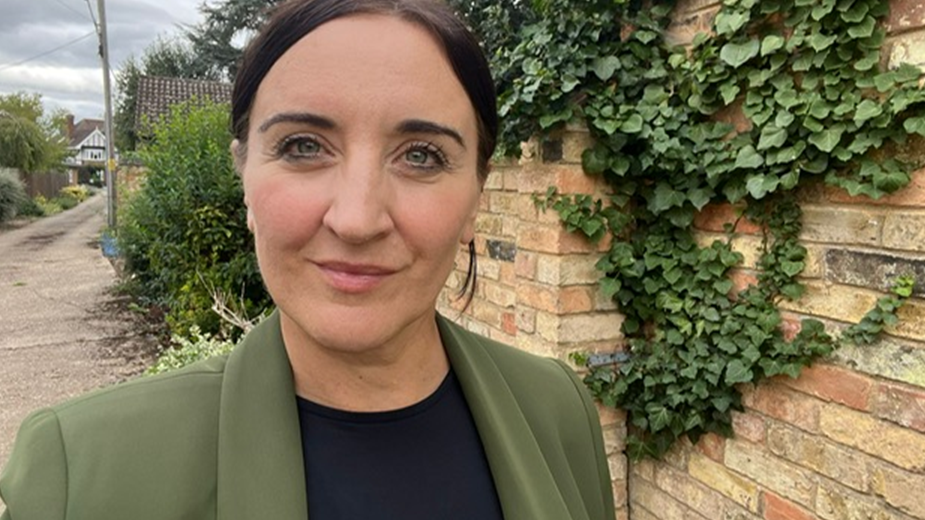Calls for halt to mesh surgery after surgeon struck off

Kath Sansom from Sling the Mesh said women have "suffered horrific complications" from the mesh surgery
- Published
Calls are being made for an immediate suspension of rectopexy bowel mesh surgery after the surgeon who pioneered the procedure was struck off.
Bristol surgeon Tony Dixon was removed from the medical register for serious misconduct, including performing unnecessary surgeries and fabricating patient records.
Patient safety campaigners and MPs say there is now growing concern over the credibility of his research, which underpins the procedure. Mr Dixon said his research remains valid, adding the "results were substantiated" by later studies.
The National Institute for Health and Care Excellence said there are "well‑recognised, serious but infrequent complications" with this type of surgery.
Kath Sansom, founder of the patient-led campaign group Sling the Mesh, said: "The government must suspend rectopexy mesh procedures immediately and launch a full review."
The Department for Health and Social Care has been contacted for comment.

Tony Dixon used artificial mesh to treat hundreds of bowel problems
An investigation by the BBC and a review by Southmead Hospital and Spire Hospital, found that more than 460 patients were harmed after Dixon operated on them unnecessarily.
Through the procedure, mesh implants are placed into the body to treat pelvic organ prolapse and incontinence in women - both of which can occur after childbirth.
The mesh, which is usually made from synthetic polypropylene, is intended to repair damaged or weakened tissue.
But Ms Sansom said: "Women have suffered horrific complications - pain, mesh erosion where it slices into nearby organs and tissues, nerve damage - and many were never warned.
"Our rectopexy members suffer some of the most horrific life-changing complications, including a high number now living with stoma bags as a result."
Rectopexy mesh is currently the most widely used type of pelvic mesh in the UK.
Mr Dixon pioneered the LVMR (laparoscopic ventral mesh rectopexy) procedure and promoted it through a series of studies.
But two separate tribunals found him to have performed operations on five patients without obtaining informed consent and that one of these procedures was not clinically indicated.
They also found that he failed to provide post operative care and to have dishonestly created patient records long after he was involved in their care.
Mr Dixon denied all the allegations against him.
Some of his studies are now flagged with formal editorial warnings due to concerns about the validity of the data.
One of his research papers has been withdrawn and nine further research papers are now under expressions of concern in medical journals, external.
Ms Sansom said: "We are appalled that the most used pelvic mesh procedure in the UK has been pioneered by a doctor who has been struck off and whose research is either withdrawn or under investigation.
"According to patient accounts shared within our group, many women who underwent surgery performed by Tony Dixon report that they were never sent a follow-up questionnaire to assess their outcomes.
"This contrasts with published claims stating that every patient operated on within a certain time frame received such questionnaires."
'Risks patient safety'
Sharon Hodgson MP, chair of the All-Party Parliamentary Group (APPG) on First Do No Harm - Mesh, Primodos and Valproate, is supporting the call for an urgent suspension of rectopexy mesh.
"This is exactly the kind of systemic failure that the Cumberlege Review warned us about," she said.
"We cannot allow research flagged with concerns and under scrutiny to inform clinical practice - especially when it risks patient safety."
The First Do No Harm report, external, chaired by Baroness Julia Cumberlege in 2020, urged systemic change in how patient harms are recognised and addressed.
As well as a suspension of rectopexy mesh procedures, campaigners are calling for a full independent safety review to be conducted.
They have also said they want to see transparency and accountability from NHS bodies and medical regulators, alongside support and compensation for patients harmed by rectopexy mesh.
In a statement, Mr Dixon said: "It is a matter of great sadness to me that the controversy surrounding my practice has led to calls to suspend rectopexy mesh procedures."
He added that he felt it "is important that steps are not taken to deprive patients in this country of effective treatments for certain pelvic organ prolapses and incontinence".
The controversy echoes previous pelvic mesh scandals that led to thousands of women across the UK suffering life-altering complications.
The Medicines and Healthcare Regulatory (MHRA) said it is now carrying out a review of rectopexy mesh.
An email from the MHRA to a patient support group noted the range of mesh used in patients were wider than those indicated by manufacturers.
The MHRA said it wants to engage with manufacturers to address using mesh "off label" for purposes it was not originally designed for.
As part of this review, they are also seeking independent expert advice on the evidence and any regulatory actions.
Meanwhile the National Institute for Health and Care Excellence, which regularly reviews and updates guidelines on the use of medical devices, said the study co-authored by Mr Dixon "was one of many considered" by its independent committee.
"The recommendation recognises the current evidence on the safety of laparoscopic ventral mesh rectopexy for internal rectal prolapse shows there are well‑recognised, serious but infrequent complications," it added.
"The evidence on efficacy and safety is limited in quality. Therefore, this procedure should only be used with special arrangements for clinical governance, consent and audit or research."
Get in touch
Tell us which stories we should cover in Bristol
Follow BBC Bristol on Facebook, external, X, external and Instagram, external. Send your story ideas to us on email or via WhatsApp on 0800 313 4630.
- Published6 August

- Published22 July

- Published18 July 2024

- Published2 July 2024
